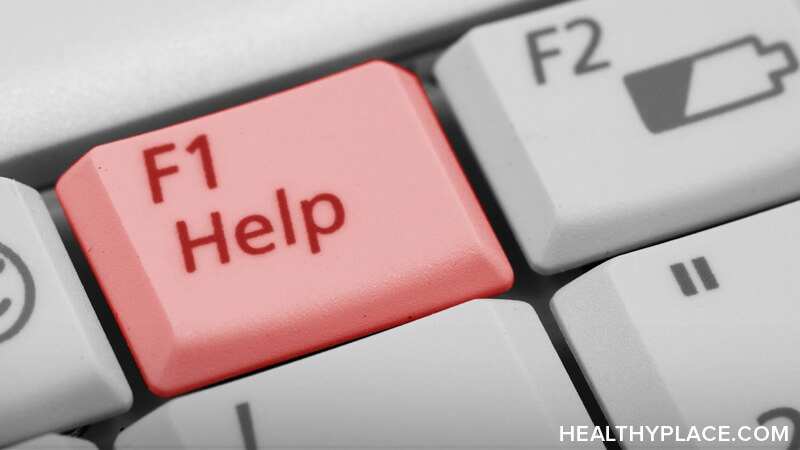Tips for Showing Support for a Friend's Emotional Wellbeing

Do you know how to show concern and support for your friend's emotional wellbeing? It can be more difficult when your friend lives with mental illness. If your friend with depression has engaged in self-destructive behaviors in the past, you might think that he or she is currently not okay and needs help. To learn about how to respond to your friend's feelings and when to show concern, read this article.
My Responses When Friends Ask Me How I Am Feeling When I'm Depressed
I have struggled with depression on and off for years, and many of my friends know this. When they ask me how I am feeling and I simply say "okay," some of them ask me if I really am okay. Most of the time, I am okay. But sometimes, saying "I'm okay," is a way that I try to self-soothe when I am in a sad or stressful situation.
I respond to my friends by either assuring them that I am fine and they do not have to worry about me, or I ask if we can talk about how I am really feeling. In any case, I know that their concern is genuine. So I make sure to verbalize my appreciation.
Signs You Should Be Supportive of Your Friend's Emotional Wellbeing
Even if someone has been diagnosed with depression, there are times when he or she will feel okay. Just like anyone without depression, expressing a neutral emotion can be completely normal. However, there are also times when showing concern for a friend's emotional state is very important.
If he or she has struggled with severe and/or recurring depression in the past, the concern could improve his or her wellbeing. It could possibly even save a life. Here are some scenarios when you should show concern:
- When your friend seemed to be in a great mood moments before showing a solemn expression
- When your friend is newly diagnosed with a mental health condition
- When your friend just returned home from an in-patient hospitalization
- When your friend showed extreme frustration after you asked if he or she was feeling okay
What to Avoid When Expressing Support for a Friend
As stated before, people with depression can be very appreciative of their friends' concerns. However, there are certain things that should be avoided when trying to show support. Here are some things to avoid doing:
- Avoid asking your friend why he or she looks sad. Sometimes he or she does not even know the answer. Depression is a sneaky (and sometimes unexplainable) condition.
- Do not show an extremely sad facial expression. This could make your friend become concerned about you.
- Refrain from asking, "Are you sure?" after your friend says that he or she is okay. This could make your friend feel like you do not trust him or her.
What to Do and Say to Show Support
While there are many things people say and do that can be viewed negatively by people with depression, there are many helpful things you can say and do instead. Here are some examples:
- In a gentle tone, say something like, "You seem down. Are you okay?" A gentle tone shows sincerity. Your tone can convey messages as much as words.
- If your friend specifically says that he or she is not okay, ask if there is anything you can do to help. This will show that you genuinely want to support the person.
- Instead of prying your friend to ask you for help, tell your friend that he or she can always come to you for help in the future.
- Do a small act of kindness for your friend, but make sure that it is something you would normally do. Just being there to listen can make a huge difference.
- Remember that your job is not to "fix" your friend, but to simply be there to support your friend.
If none of the suggestions seem to help put your mind at ease, it can be very helpful to talk to someone who has been a supporter of a friend or family member with depression. You might already know some people you can talk to. You can also look into support groups to learn about mood disorders and how to better understand and help people who have them.
Do you have tips for showing support for a friend's wellbeing? Share them in the comments.
APA Reference
Lueck, M.
(2020, February 23). Tips for Showing Support for a Friend's Emotional Wellbeing, HealthyPlace. Retrieved
on 2026, February 27 from https://www.healthyplace.com/blogs/toughtimes/2020/2/tips-for-showing-support-for-a-friends-emotional-wellbeing
Author: Martha Lueck
This is such a beautifully expressed read. I love the whole concept of gently and genuinely supporting your friend. One piece in particular that I have to make mention of is the idea that it is not your job to "fix" your friend. This is something so many of us can easily shift into without even really realizing we're doing, the "fix it" mood. This naturally happens because we care and want to make the other person feel better but what we really need to do is hold space, the fixing can make the other person inherently feel like they are a problem to be fixed, and this is of course not what you're trying to convey. Thank you for sharing!